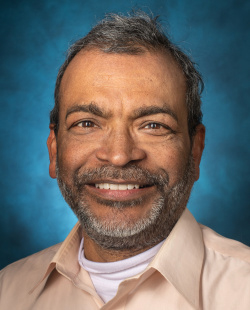Agrawal, Arun

Arun Agrawal
Dr. Arun Agrawal is the Samuel Trask Dana Professor of Governance and Sustainability at the University of Michigan School for Environment and Sustainability, with a courtesy appointment at the Ford School. His research and teaching include the politics of international development, institutional change, environmental conservation, and sustainability. He has published work on indigenous knowledge, community-based conservation, common pool resources, and environmental identities. Dr. Agrawal founded and led the FLARE Network (now hosted at the University of Notre Dame) to advance knowledge at the intersection of forests and livelihoods and facilitate its application to policy and practice. Dr. Agrawal also coordinated the University of Michigan’s Collaborating Research Center for the International Forestry Resources and Institutions network initiated by Nobel Laureate Elinor Ostrom in 1992.
Ferraro, P. and Agrawal, A. (2021). Synthesizing evidence in sustainability science through harmonized experiments: Community monitoring in common pool resource. Proceedings of the National Academy of Sciences, 118 (29)
Oldekop, J.,Rasmussen, L.V., Agrawal, A., et al. (2020). Forest-linked livelihoods in a globalized world. Nature Plants, 6(12)
Newton, P., Kinzer, A.T., Miller, D.C., Oldekop, J.A., Agrawal, A. (2020). The number and spatial distribution of forest-proximate people globally. One Earth, 3(3).
Agrawal, Arun. (2005). Environmentality: Technologies of Government and the Making of Subjects. Duke University Press.
Agrawal, A. (1999). Greener Pastures: Politics, Markets, and Community among a Migrant Pastoral People. Durham NC: Duke University Press. (Jointly published by Oxford University Press, New Delhi).
Dr. Agrawal was born in Forbesganj, Bihar, India, in 1962. Agrawal attributed his interest in the environmental field to reading a lot of Indian myths and religious texts. Agrawal attended St. Michael’s High School in Patna. He received his bachelor’s degree in History from the University of Delhi in 1983. He later pursued an MBA in Development Administration and Public Policy from the Indian Institute of Management Ahmedabad, which he completed in 1985. He moved to the United States for his doctorate in political science at Duke University and graduated in 1992. His doctoral dissertation involved understanding how Indian shepherds in Himalayas manage commonly held resources.
In his leisurely hours, Agrawal likes to take walks in local green spaces, sometimes alone or with his family, and most times with his collie, Stella. In peak seasons, Arun likes to forage covertly for wild mushrooms.
After completion of his postdoc, Dr. Agrawal taught at the University of Florida (1993-1997), Yale University (1997-2002), and McGill University (2002-2003). In 2003, he began teaching at the University of Michigan in Ann Arbor, where he continues to teach up until now. His research focuses on environmental politics, governance, and sustainable development issues. Dr. Agrawal’s research and teaching emphasize the politics of international development, institutional change, and environmental conservation. He has written extensively on 1) indigenous knowledge, 2) community-based conservation, 3) common property, 4) population and resources, and 5) environmental identities.
His recent interests include decentralizing environmental policy (especially forestry and wildlife) and the emergence of the environment as a subject of human concern. The geographical focus of his work includes South Asia and other developing countries in Africa and Latin America.
Dr. Agrawal coordinated the International Forestry Resources and Institutions (IFRI) network that Nobel Laureate Elinor Ostrom initiated at the University of Indiana in 1992. Inspired by IFRI, he launched the Forests and Livelihoods: Assessment, Research, and Engagement (FLARE) Network in 2015, just before the landmark Conference of Parties (COP) on Climate Change meeting in Paris. Since 2021, the FLARE Network Secretariat has been based at the Keough School of Global Affairs at the University of Notre Dame under the leadership of Dr. Daniel C. Miller.
Dr. Agrawal was the editor-in-chief of the scholarly journal World Development from 2013-2021. He was elected to the National Academy of Sciences in 2018. In 2022, Dr. Agrawal was chosen to co-chair the Transformative Change Assessment for the Intergovernmental Platform on Biodiversity and Ecosystem Services (IPBES). The Transformative Change Assessment will “offer practical options for concrete action to foster, accelerate and maintain the transformative change necessary for a more sustainable future.”
Dr. Agrawal completed a postdoc at Indiana University, where he worked with Elinor and Vincent Ostrom. Dr. Agrawal credits them as very supportive mentors in his career. Dr. Agrawal also said that his cohort in graduate school was inspiring to be alongside.
Dr. Agrawal has been a mentor for both doctoral and postdoctoral researchers over the last 20 years. His doctoral students include Witchuda Srang-Iam, Catherine Benson, Christoph Nolte, James Erbaugh, Jonathan Sullivan, and Daniel Miller. Dr. Agrawal’s postdoctoral mentees include Bhim Adhikari, Lauren Persha, Pete Newton, Johan Oldekop, Chuan Liao, Reem Hajjar, Suhyun Jung, Wean Liu, and Elizabeth Ludwig-Brocz.
Dr. Agrawal states that if you have to make a mistake, err on the side of generosity. He has also said that as a student, you should be strategic in selecting research topics where you are able to combine your passion with the relevance of the field.
Arun Agrawal. (2023, March 5). In Wikipedia. https://en.wikipedia.org/wiki/Arun_Agrawal
Survey and interviews conducted by Justice, Equity, Diversity, and Sustainability Initiative staff. 2022-2023. Yale University-School of the Environment. New Haven, Connecticut.
University of Michigan SEAS. 2023. Arun Agrawal. https://seas.umich.edu/research/faculty/arun-agrawal.
University of Michigan SEAS. 2023. Dr. Arun Agrawal Announced as Co-Chair on Intergovernmental Transformative Change Assessment. https://seas.umich.edu/news/dr-arun-agrawal-announced-co-chair-intergove….